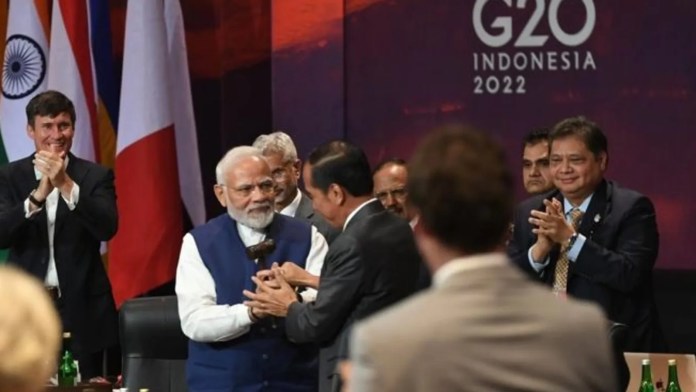It may turn out to be a message lost in metaphor and hence must be made explicit. Prime Minister Narendra Modi’s speech addressing the Group of 20 big and emerging economies, G20, which has been carried as an article in all leading news mediums of India, emphasises “one-ness” of the world, a clear invocation from the Upanishadic slogan of vasudhaiva kutumbakam (the world is family) that the Sangh Parivar, including the ruling BJP, and the government have been voicing on world platforms for a while now. While hardcore Hindus say the current regime leaves them underwhelmed, even as the left-liberal cabal cries foul over too much of Hindutva, the soft Indic civilisation-oriented push is undeniably the dispensation’s leitmotif and, criticise it as one may in a way befitting one’s ideology, this is what the Modi government will do throughout (but no more and no less). Seizing the opportunity, Prime Minister Modi says, ‘We see it when countries fight over territory or resources.” He talks of how humanity has suffered, especially during the two-year-long pandemic, when “supplies of essential goods are weaponised”, which is how China, the origin of the coronavirus, behaved. Even as the world was crying for help, Beijing eyed opportunities for territorial expansion and went to the extent of arm-twisting other nations, suspending before them the lolly of essential medical supplies and safety kits. Condemning this selfishness, which the premier says is a “mindset” that has plagued geopolitics for ages, he adds that the Bharatiya outlook is the solution.
The subtlety of Modi’s expressions is a classic case of right diplomacy and politics. His is the language of India’s ancient yet continuous and thriving culture; yet nobody can object to his judicious choice of words. He begins with the courtesy of thanking all 17 of the previous presidencies of G20 and quickly switches gears to uphold what is morally right and deplore what is ethically misplaced. Make no mistake about it, though. This is not Jawaharlal Nehru’s Panchsheel. From the retaliation to terrorist attacks in Uri and Pulwama to the tough stand in Doklam and avenging 20 jawans’ deaths by snuffing life out of more than double as many soldiers of the Chinese PLA in Galwan, Modi has made the point he does not suffer Nehruvian fools.
So, what is India going to do with the G20 leadership for the next 365 days? The prime minister’s speech has set the agenda with the slogan, “One Earth, One Family, One Future.” This is yet another metaphor, implying sharing of resources to build a better tomorrow. That future, if the word “family” is another analogy, to hazard a guess, will entail a policy to preserve the basic unit of society, threatened by NGO-dictated legislation under successive predecessors of the current government. It certainly is an allusion to education, the intellectual and physical resources for which may be drawn from the best practices in the domain of schooling and university-level, technical-grade training. Of course, G20 is no G7, let alone UNSC where a motley group unfairly enjoys veto power. But G20 is a reality of the post-Cold War generation that even the West is bound to come to terms with in this era of a few avoidable conflicts of the Russia-Ukraine type. G20, unlike the other two groupings, was formed not out of a necessity to cartelise power but as a recognition of the truism that the club of important nations called for several new members that overcame colonialism. India leads this league of Phoenix with a distinct vision and sustainable programme, which Modi’s speech reflects.




You must log in to post a comment.